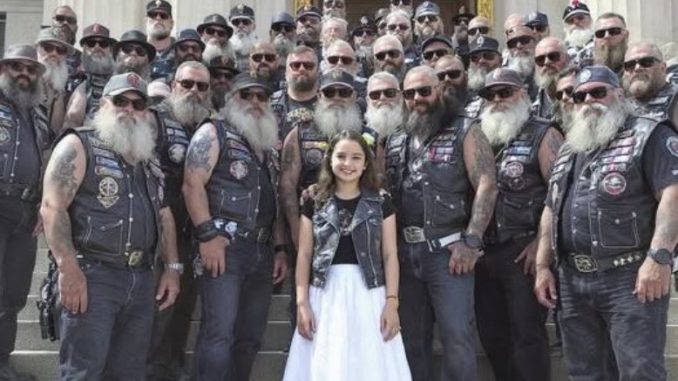
It was supposed to be an ordinary afternoon outside the courthouse, but the moment one young girl began to cry on the front steps, everything changed.
Fifteen-year-old Maya stood alone, holding her phone tightly as she tried to reach her foster mother. She was overwhelmed, unsure, and frightened by the thought of facing a complicated custody hearing without anyone by her side. People in formal suits walked past her, busy and distracted, unaware of the emotions unfolding right in front of them.
Inside the courthouse, a man known as Big Mike — a biker with a reputation for kindness around town — was paying a routine traffic fine. Through a crack in the courthouse door, he heard a soft, shaky voice asking if anyone could help her. Something about the fear in her tone made him step outside.
“What’s going on, kid?” he asked gently.
Maya explained that her foster mother had been delayed and couldn’t make it on time, leaving her to handle the hearing alone. She was anxious, worried her voice wouldn’t be heard, and didn’t know who she could rely on.
Big Mike nodded slowly. He didn’t know Maya, but he understood fear — and he knew what it felt like to face something bigger than yourself. Without saying another word, he pulled out his phone and sent a message to a few friends.
Twenty minutes later, the rumble of motorcycles filled the street.
Dozens of bikers from different community riding clubs pulled up: the Iron Guardians, the Veterans of Steel, the Highway Brothers, and even a local faith-based group. Many had never met each other before, but one message brought them all together: A kid needs support.
Forty-seven bikers walked into the courthouse, not with hostility but with steady calm. Their presence wasn’t about intimidation — it was about making sure Maya didn’t feel invisible anymore.
When court officials asked why so many people were there, Big Mike simply replied, “We’re here as moral support. No one should face something important alone.”
Maya sat at her table, her shoulders relaxing as she felt dozens of protective eyes standing quietly behind her. Soon after, a new attorney representing her arrived — a woman who had volunteered to step in after hearing Maya’s situation. She carried organized documents, clear explanations, and the reassurance Maya desperately needed.
During the hearing, Maya spoke softly but bravely about her experiences, her hopes, and her desire to stay with the foster family where she felt safe and supported. The judge listened carefully, appreciating her courage.
By the end of the session, the judge granted stability for Maya’s placement and ordered additional guidance to ensure her best interests were protected going forward.
The bikers never spoke out of turn. They didn’t need to. Their presence alone gave Maya the confidence to tell her story.
After the hearing, Maya hugged Big Mike, tears in her eyes. “Why did you come?” she asked.
He smiled and said, “Because everyone deserves someone in their corner.”
The story spread online, inspiring thousands with its message: community isn’t about blood — it’s about showing up.